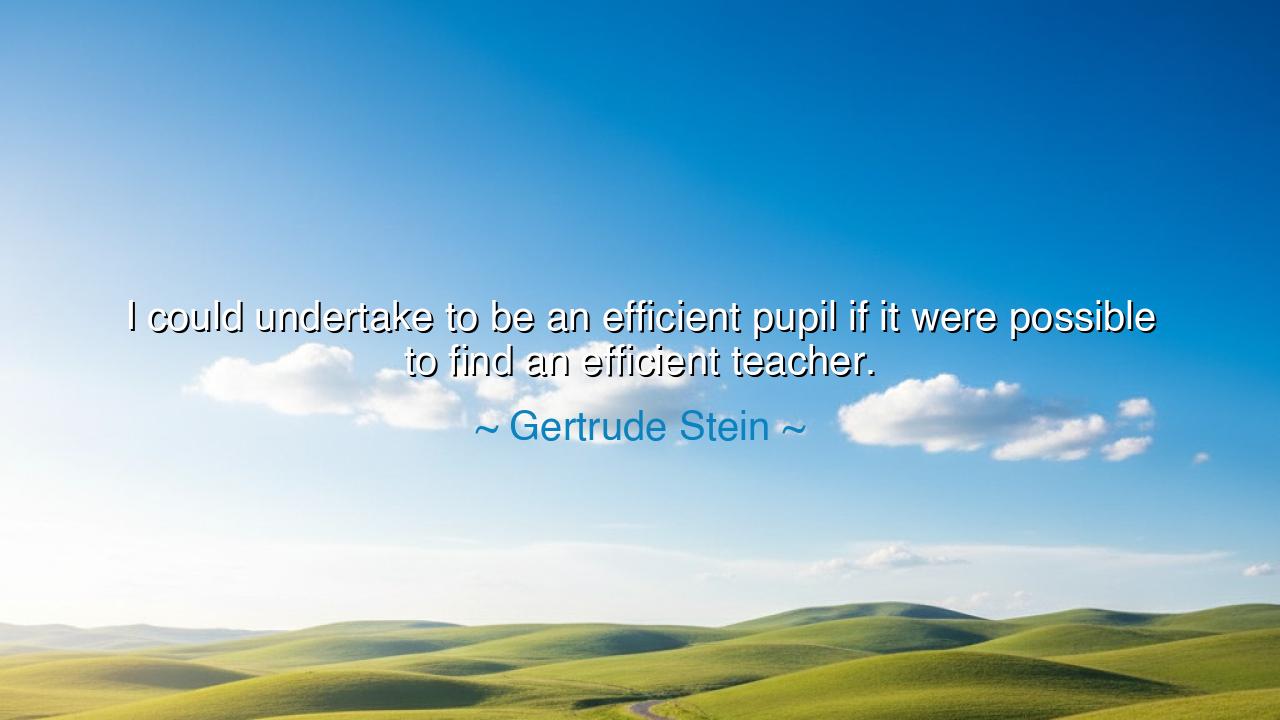
I could undertake to be an efficient pupil if it were possible
I could undertake to be an efficient pupil if it were possible to find an efficient teacher.






Hear, O seekers of truth, the sharp and searching words of Gertrude Stein: “I could undertake to be an efficient pupil if it were possible to find an efficient teacher.” In this line, she does not speak with malice, but with the wit of one who sees deeply into the struggle between pupil and teacher. She reminds us that learning is not born from the student alone, nor from the teacher alone, but from the union of the two. For what is the eager mind without guidance, or the greatest guide without a willing listener? Both must meet in excellence for knowledge to flourish.
In her time, Stein was both pupil and teacher, absorbing wisdom from others, yet also shaping the minds of artists and writers who gathered around her in Paris. She knew well the hunger of the student who longs for clarity, structure, and mastery. Yet she also saw the failures of those who claimed to instruct but lacked the skill to awaken the mind. Her words carry the ancient truth: to learn well, one must first be taught well. The seed may be fertile, but if the sower is careless, the harvest is poor.
Consider the story of Alexander the Great and his teacher, Aristotle. Had Alexander been left unguided, his ambition might have been reckless, his strength wasted. But under Aristotle’s instruction, he gained philosophy, science, and the vision of empire. It was the union of the brilliant pupil and the efficient teacher that produced a conqueror who dreamed not only of lands, but of knowledge and unity. Without Aristotle, Alexander may have been mighty but not wise; without Alexander, Aristotle’s teachings may not have reshaped the world.
History offers the opposite lesson as well. How many children, full of curiosity, have had their flame of learning extinguished by dull or careless teachers? How many talents were buried because no one guided them toward mastery? Genius alone is not enough; it must be nurtured, directed, sharpened. Even the strongest blade must be forged in fire and hammered by skilled hands. Without an efficient teacher, the pupil’s strength may lie dormant, or worse, be turned to waste.
Yet Stein’s words also carry a challenge to the pupil. To blame the teacher entirely is folly. The efficient teacher calls forth not passive obedience, but active engagement. The true student must not wait idly but must hunger, must question, must wrestle with ideas. When the right teacher is found, the right student must also be ready to rise, lest the gift be squandered. Learning is a covenant, not a one-sided gift.
The lesson here is balance. Seek out mentors who inspire, who guide with clarity and strength. Do not settle for poor instruction, for it may dim your spirit. Yet also cultivate within yourself the discipline of the efficient pupil—one who listens deeply, practices faithfully, and pursues truth even beyond the classroom. When pupil and teacher rise together, wisdom is born, and the world is changed.
Practical wisdom follows: in your life, find teachers worthy of your time. Seek those who live the lessons they proclaim, whose words carry weight because they are rooted in practice. And when you teach others, strive not only to give knowledge but to awaken desire, to show the path as well as the destination. For only then will your pupils become efficient, and your teaching endure.
Thus, O children of tomorrow, remember Stein’s truth: the greatness of the pupil rests also upon the greatness of the teacher. Honor both roles, whether you learn or whether you instruct. For when wisdom flows freely between them, both are lifted, and the treasures of knowledge become a light for generations.






AAdministratorAdministrator
Welcome, honored guests. Please leave a comment, we will respond soon